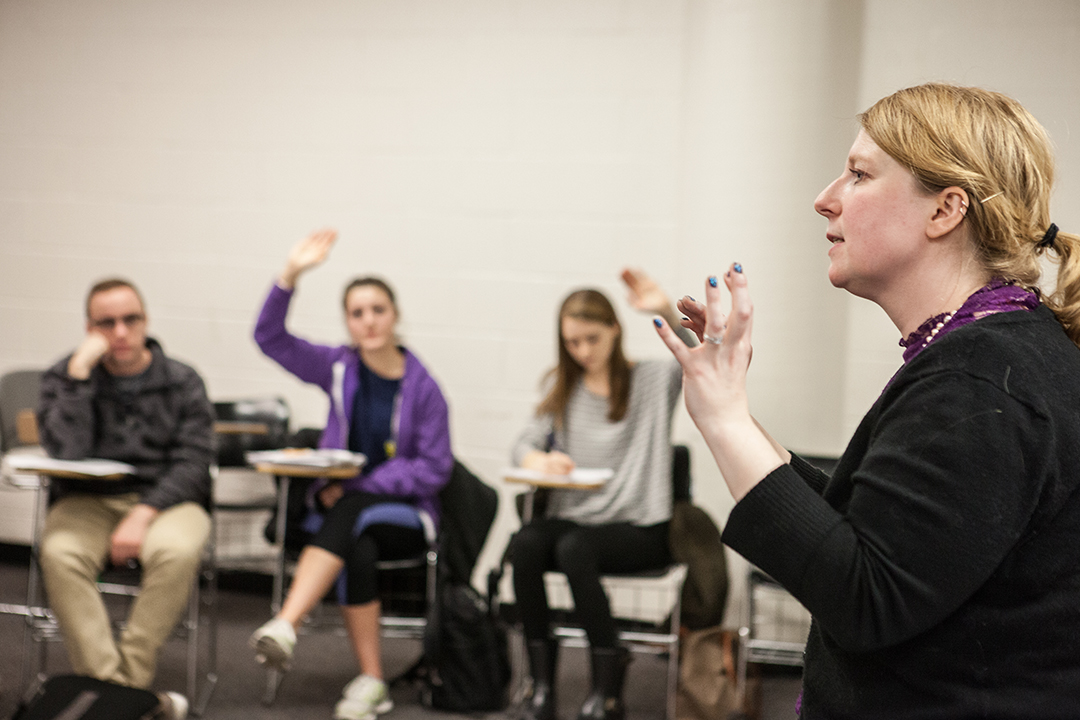By John DiConsiglio
Step into Assistant Professor of Philosophy Laura Papish’s Dean’s Seminar on the Philosophy of Love, Sex and Friendship and you might think you took a wrong turn on your way to a lecture hall. You won’t find a speaker behind a lectern waxing about Sigmund Freud. Instead, you’re likely to land smack in the middle of a whirlwind discussion among 16 engaged first-year students arranged in a semi-circle, their arms shooting into the air as they compete to have the last word on whether there’s any philosophical merit to The Bachelor.
“This is one wild class,” said freshman Dori Goodman. “The conversation moves really fast and in all different directions. It can be hard just to get a word in.”
That’s exactly what Papish was hoping for when she designed her course which, like other Dean’s Seminars, allows Columbian College freshmen to focus on specific topics with an emphasis on critical thinking and inquiring discourse.
Rather than leaning heavily on a syllabus and lectures, Papish invites her students to jump head-first into free-flowing debates on what-we-talk-about-when-we-talk-about-love. And while Aristotle and Plato are among the heavy hitters on the reading list, Papish encourages the class to draw on everything from philosophical texts to personal experiences as they reflect on the seminar’s big questions: Are friends different from lovers? Why do we want to be involved in intimate relationships when they cause us so much heartache? Are these relationships morally good, or can they pose an ethical threat? And what to make of fireworks-topics like pornography and censorship?
“These are questions that we may live with every day, but we don’t really take time to think about them,” Papish said. “I want students to look at their relationships in ways they’ve never done before.”
Building a Philosophy Mindset
Papish set out to design a course that would appeal to freshmen, many of whom have never taken a philosophy class. Even the class title is meant to draw attention. “If I were flipping through a course catalog and I saw something called ‘Love, Sex and Friendship,’ that would jump out at me,” she said.
While the course attracted students with an array of interests—from budding philosophers to math majors to ROTC cadets—few have sat through an actual philosophy class before. Most are unaccustomed to the discipline’s lengthy reading requirements and its well-researched scholarly writing assignments—much less the spirited discussions. Indeed, Papish revealed that the first teaching hurdle she faced wasn’t eliciting debates on love and sex. It was showing her students how to think like philosophers.
“As a freshman, you don’t necessarily have any philosophy background so part of the challenge is simply introducing them to what philosophy means,” she said. Philosophy isn’t sitting cross-legged on the floor, talking about your feelings, Papish stressed. "There are some pretty dense readings. There are papers that must be backed up by citations and well-constructed arguments. Once you’ve mastered all that, then you can talk about how you feel.”
In one sense, noted political science major and ROTC member Michael Rossi, the class is particularly applicable to the freshman experience. “When you first get to college, you want to be friends with everyone. You don’t want to be lonely or bored,” he said. “This class has taught me how to be more cognitive of my relationships. It met me right where my life was at.”
For Mady Alfieris, a double major in computational mathematics and economics, a philosophy course on love and sex seemed like a fun way to earn humanities credits. Attracted to the intimate class-size of a Dean’s Seminar, she still had butterflies when she first entered Papish’s raucous semi-circle.
“Philosophy is not my strong suit so I was a little nervous,” she said. “But Laura is so open and friendly. She’s not lecturing; she’s having a conversation with us. After the first class, I walked out and thought, ‘OK, I can do this.’”
Still, Papish expects her students to roll up their sleeves for philosophical skirmishes; whether it’s Aristotle versus cotemporary philosopher Harry Frankfurt (Do we love someone because they have valuable qualities, as Aristotle argues? Or do we ascribe value to the ones we love, as Frankfurt contends?) or hot-button issues like pornography (Pick a side: Stanford philosopher Helen Longino’s claims that pornography should be banned as libel against women or bioethicist Mark Wicclair’s cautions against sexual censorship). One day, the class may explore the infighting between sex-positive and sex-negative feminists, and the next debate scholarly tracts with titles like “Talk Dirty to Me” and “Rethinking Sadomasochism.”
Papish knows that, while a smattering of her students may go on to study philosophy, others may never step into a philosophy classroom again. “I may only have this brief moment to help them see things differently,” she said. As far as organizational sciences major Goodman is concerned, Papish’s mission is accomplished. “She’s taught me to read something from a different point of view and think ‘Wow, I never considered that before,’” she said. “After every class, I actually feel enlightened.”


